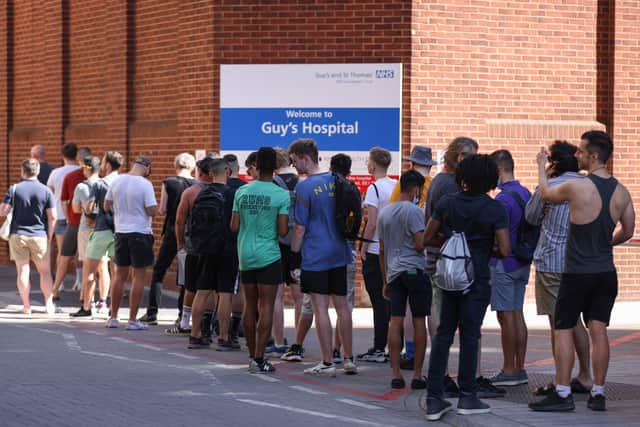Monkeypox vaccine side effects: 5 possible symptoms after having MVA jab - and how long side effects can last
and live on Freeview channel 276
The UK has been offering the Monkeypox vaccine to eligible people in a bid to curb growing rates of infection.
Cases of the virus have been steadily rising across the world, with the USA declaring it a public health emergency.
Advertisement
Hide AdAdvertisement
Hide AdWhilst in Europe, the WHO have also declared the incident a global health crisis, declaring risk for contracting the virus as “high”.
Monkeypox causes a high temperature, headache, muscle aches, backache, swollen glands and skin lesions.
However, there is a vaccine available, with the UK currently rolling out its vaccination programme.
Side effects are uncommon, but it is important to be prepared before your vaccine.
Advertisement
Hide AdAdvertisement
Hide AdHere’s everything you need to know about Monkeypox vaccine side effects.


What is the Monkeypox vaccine?
Monkeypox is a similar virus to smallpox, this means that vaccines used to treat smallpox can offer protection and reduce the severity of an infection.
The Modified Vaccinia Ankara (MVA) vaccine was created in the 1970s and has been used effectively in the UK and abroad as a vaccination against smallpox.
When you receive the vaccine, your body’s immune system will produce antibodies against the virus.
Advertisement
Hide AdAdvertisement
Hide AdTwo doses of vaccine will be given to offer people a good level of protection, whilst it is less clear how much protection one dose will offer.
The vaccine will take time to work, reaching its highest rate of protection at around 4 weeks.
The MVA vaccine does not contain the smallpox virus and cannot spread or cause it.
Who is eligible for the Monkeypox vaccine?
The Monkeypox MVA vaccine is currently available for:
- healthcare workers who are caring for and who are due to start caring for a patient with confirmed monkeypox
- gay, bisexual and other men who have sex with men. Your clinician will advise vaccination for you if you have multiple partners, participate in group sex or attend ‘sex on premises’ venues
- people who have already had close contact with a patient with confirmed monkeypox. Vaccination with a single dose of vaccine should be offered as soon as possible (ideally within 4 days but sometimes up to 14 days)


What are Monkeypox vaccine side effects?
The Monkeypox vaccine has a good safety profile, but can cause side effects.
Advertisement
Hide AdAdvertisement
Hide AdThese are usually mild and not everyone who gets the vaccine will experience them.
Side effects may be more common in anyone who has received a dose of live smallpox vaccine.
Unlike the live smallpox vaccine, the monkeypox vaccination does not leave a scar.
If you experience any side effects after your vaccination, you should chat with your doctor, pharmacist, nurse or call 111.
Advertisement
Hide AdAdvertisement
Hide AdThis includes any possible side effects not mentioned below.
Common side effects
Common side effects according to gov.uk can include:
- pain and itching at the injection site
- headache
- muscle ache
- sickness and tiredness
- one in 10 people experiencing chills and fever.
If you experience any of the common side effects mentioned, its important that you allow yourself time to rest and recover.
If you have atopic dermatitis, you can sometimes experience a skin reaction which includes redness, swelling and itching around the injection site.
You could also experience symptoms including: headaches, muscle pain, feeling sick or tired and a flare-up of your skin condition.
Fainting can also happen after receiving your vaccine.
Advertisement
Hide AdAdvertisement
Hide AdIf you do faint, it’s important to stay flat on your back with your legs raised and call for help.
Serious side effects
Whilst exceptionally rare, it’s important to be aware of potential serious side effects from the vaccine.
If you have the following side effects after your vaccination, seek emergency care by ringing 99.
Serious side effects include:
- difficult or noisy breathing or wheezing
- swollen tongue
- prolonged fainting or unconsciousness
- confusion
These side effects could be caused by a rare allergic reaction and usually occur 15 minutes after the vaccination is administered.
Comment Guidelines
National World encourages reader discussion on our stories. User feedback, insights and back-and-forth exchanges add a rich layer of context to reporting. Please review our Community Guidelines before commenting.
